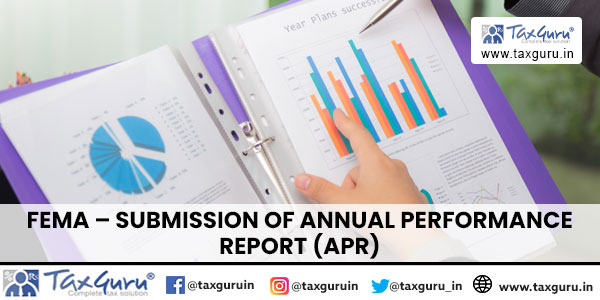Introduction:
The Foreign Exchange Management Act (FEMA) aims to regularise movement in forex to/from India. All forex transactions are bifurcated in capital account and current account transactions requiring different reporting reequipments for each set of transactions. One of such requirements under FEMA is to submit an Annual Performance Report (APR) which contains details of overseas entity, its financial position, acquisition or setting up or winding up or transfer of a step-down subsidiary or alteration in the shareholding pattern in the foreign entity during the reporting period. This article covers applicability, frequency, due date, Penalties, requirement of audited financial statements etc in relation to APR.
Applicability of “APR”:
A person resident in India acquiring/subscribing equity capital in a foreign entity which is considered as Overseas Direct Investment (ODI), shall submit an APR to Authorised Dealer (AD) Bank with respect to each foreign entity. In following scenario, it is not required to file APR:
- a person resident in India (PRII) is holding less than 10% of the equity capital without control in the foreign entity (FE) and there is no other financial commitment (FC) other than by way of equity capital; or
- a foreign entity is under liquidation.

Audited financial statements:
Foreign Exchange Management (Overseas Investment) Regulations, 2022 has made it mandatory for the Resident Individuals/Indian Entity to submit an APR based on the audited financial statements of the foreign entity.
It is to be noted that in case where person resident in India does not have control in the foreign entity and it is not mandatory get accounts audited in host country, the APR may be submitted based on unaudited financial statements certified by the statutory auditor of the Indian entity or by a chartered accountant where the statutory audit is not applicable. It is imperative to note here that audited financial statement must be require where Indian resident has control over foreign entity even if the host country does not mandate it.
Repatriation of dues receivable:
A person resident in India having ODI in a foreign entity shall realise and repatriate to India, all dues receivable from the foreign entity with respect to investment in such foreign entity, within ninety days from the date when such receivables fall due. The Statutory Auditor/Chartered Accountant of the Indian investor has to certify that the IE/ RI repatriated to India, all dues receivable from the foreign entity. The professional has to be very cautious and should apply robust analytical procedure to ascertain the outstanding dues and its remittance to India before putting signature on certificate.
Due date:
The Indian Party is required to submit the APR physically to AD Bank based on Audited Financial Statements of the overseas entity by 31 December of every year.
Consequences of Non-Compliance:
- In case Indian Party submits APR after due date, Late submission fees for filing of each APR is INR 7,500/- per year. The option of LSF shall be available up to three years from the due date of reporting/submission.
- Restriction on any outward remittance/further financial commitment by resident investors till regularisation of pending reporting of APR
- Over and above general penalty of 3 times of sum involved may be levied depending on the volume, duration of delay, severity of non-compliances etc.
Role of Statutory Auditor/CA:
- As discussed above APR must be prepared based on audited financial statements of foreign entity. Who will audit the finical statement is not specifically defined in regulation. AD bank has inhouse guidelines to processing of APR and many banks are accepting financial statements of foreign entity duly audited by Indian Chartered Accountants. The person auditing such financial statement should apply accounting and auditing standards as per his best judgement. It is advisable to have exercise professional judgement based on facts before selection of reporting framework and application of accounting and auditing standards.
- Over and above this, responsibility has been casted upon the Statutory auditor/CAs to certify repatriation of outstanding dues receivables to India and to check whether APR has been prepared on audited or unaudited financial statement of foreign entity.
Conclusion:
The efforts of authorities to monitor particular framework/transactions would depends on how accurate the data is and by what time data is flowing to them. Reporting by Indian Residents through APR helps in regulating foreign investments and annually assessing their performance which assist authority to assess/monitor the overall framework/transactions. This improvs transparency in system and decision-making process resulting to economic growth of the nation.
*****
Author: S N S S & Co | Chartered Accountant | Niranjan Shah
Disclaimer: This blog is intended for educational purposes only and should not be interpreted as tax advice. It is recommended to seek guidance from a qualified professional for advice relevant to your circumstances. For any feedback, inquiries, or suggestions, please feel free to reach out to the author at niranjan@snssindia.in / Contact No +91 982 586 0488.





